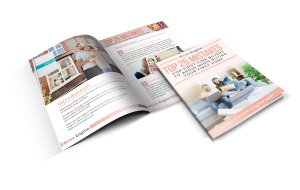If you’re looking for more information to make sense of the Help to Buy Scheme, we’ve come up with the pros and cons to help you decide if it’s right for you.
Pros
You can buy a home sooner
Help to Buy was created to help people on lower incomes buy their own home. The average UK home costs £224,000 (ONS data) and a buyer would need a 5% deposit of £11,200 to secure a mortgage.
You can buy with a smaller deposit
You will only need to save a 5% deposit to buy your first home.
Your government loan is interest-free
You can borrow up to 20% of the value of a new build home from the government interest-free for the first five years. In London, it’s 40% of the cost of the property.
You can access better mortgage rates
Since you now have 25% of the cost of your property (5% deposit + 20% government loan), you will be able to access better mortgage rates than would be possible with a 95% mortgage.
Your loan rate is competitive
After five interest-free years, your loan’s initial rate of interest is only 1.75% in the sixth year.
This might be the only way you can get on the property ladder
As long as you can afford it and are aware of the implications, then this is your opportunity to buy your own home. You might be able to buy a larger property more suited to your needs. For example, if you have a growing family and want three bedrooms, but can only afford a two bedroom property.
Cons
You can only buy a new build home
Help to Buy is only offered by some developers, so your choice of home and location is limited.
You will probably be paying more for your home
New builds are generally more expensive than older homes. According to research by reallymoving.com those using Help to Buy paid an average of £278,000 for their property and those who did not paid £257,000. When you come to sell this could be an issue. So think carefully about how long you will live in the property.
Your loan will be increasingly expensive
After six years the government loan fee increases every year at 1% above inflation. Not only does it get more expensive year on year, but also any increase in the Bank of England base rate will have a significant impact on the loan repayment. This could be hundreds of pounds each month; on top of you mortgage payment.
Your loan is not a fixed amount
Your loan value varies based on the market value of your property. If your home increases in value then you may be required to pay back a lot more than you originally borrowed.
You are limited to certain lenders
Not all lenders offer Help to Buy mortgages because a third party (the government) is involved in your purchase. Those that do, often have ‘special’ mortgages that are different from their standard mortgage products. You may need extra help to find a suitable mortgage.
You might find remortgaging tricky
Remortgaging a Help to Buy property can be difficult. Some lenders will take the governments equity loan into account when valuing the property, rather than calculating on your share of the property alone.
You might be in danger of negative equity
Negative equity is when you owe more on your property than what it is worth. Property experts are concerned that the Help to Buy Scheme has temporarily inflated house prices, and expect them to drop when the scheme ends leaving many people in negative equity.You are at the mercy of the government There is nothing to stop future governments changing the terms of the scheme for better or worse.
Still confused as to whether Help to Buy is a good or bad thing?
Top tip – take the list of ‘cons’ and ask yourself whether any of them are a deal breaker and if not, how you could manage it? For example:
- You can only buy a new build home – is that an issue?
- You will probably be paying more for your home – does that matter?
- Your loan will be increasingly expensive – could you plan for and manage this? A simple budget plan could set your mind at ease.
- Your loan is not a fixed amount – could you plan to pay it off quicker?
- You are limited to certain lenders – can you shop around for the best deal or get help from a mortgage broker?
- You might find remortgaging tricky – tricky but not impossible? Do your research and take advice.
- You might be in danger of negative equity – in the short term, yes, but if you are planning to live there for many years, it may not be an issue.
You are at the mercy of the government – it’s not just your home, everything can be impacted by a change in government.








